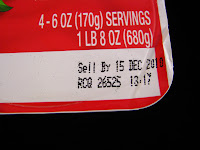I'll be the first to admit that I have a slight coupon addiction. OK, the word slight might be an understatement. Mr. T kindly asked me to not go to the store yesterday, but I just couldn't resist. It's not that he minds me spending the few measly dollars I spend, but it's the piles and piles of groceries, still in bags, at the bottom of the basement stairs, that have yet to be put away, that get to him. That's just what happens during a super doubles week. I just see no need to put them away until the savings frenzy is over.
Heather and I use these weeks to
stockpile, stockpile and stockpile.
Some people ask if the food we buy goes bad before we can use it. Sure, sometimes. But that happens to everyone. Don't tell me you've NEVER thrown food out. Actually I probably throw out less food than most. For one, I know what I have on hand so I plan my meals accordingly. I always buy products that I know my family will use/enjoy. And last but certainly not least, I understand label lingo.
According to an 8-year University of Arizona study on U.S. Food Waste, “Americans are tossing out at least $75 billion in food each year…The average American family throws away 14 percent of their food. In terms of money, that’s almost $600 every year in meats, fruit, vegetables and grain products.” Other estimates pin U.S. food waste as high as 33 percent. YIKES! That's a lot of money to be throwing away!
Understanding what shelf-life dates mean is the first step in cutting food waste.You may be surprised to learn that dating is not required by US federal law, with the exception of infant formula and baby foods which must be withdrawn by their expiration date. For all other foods, except dairy products in some states, freshness dating is strictly voluntary on the part of manufacturers. Stores are not legally required to remove outdated products from their shelves. So, it's important to always read the label.
-----------------------------------------------------------------------------------------------------------------------
After this date foods may be unsafe to eat even if they look fine because the nutrients in the food may become unstable or a build-up of bacteria may occur.
It is illegal to sell foods after their use-by date has expired.
Common use-by foods include milk, sliced ham, and shaved meats.
BEST BEFORE or BEST IF USED BY - foods are still safe to eat after this date as long as they are not damaged, deteriorated or perished.
The best before date simply indicates that the product may have lost some its quality after this date passes.
Foods can be legally sold after the best before date (as long as they are not damaged, deteriorated or perished.)
You can expect these foods to retain their colour, taste, texture and flavor as long as they are stored correctly.
Common best before foods include canned foods, cereals, biscuits, sauces, chocolate, sugar, flour and frozen foods.
Did you know that canned veggies can last up to 5 years? Talk about a shelf life!
There are a few exceptions to this rule.
Yogurt and Milk that have been refrigerated below 40 degrees F can last up to a week past this date.
Refrigerated eggs are good for up to an additional 5 weeks from the date listed.
For more information visit the USDA Food Product Dating Page.




No comments:
Post a Comment